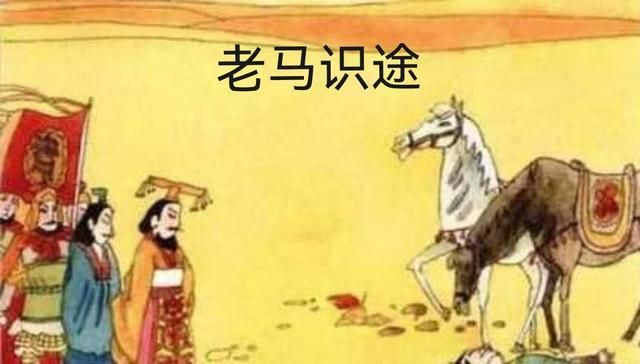
The allusion of "An Old Horse Knows the Way" originates from a story in "Han Feizi". The story tells that during the Spring and Autumn Period and the Warring States Period, Duke Huan of Qi responded to the request of the Yan State and sent troops to attack the invading Shanrong. The Prime Minister Guan Zhong and the Grand Minister Xi Peng accompanied him. The Qi army set out in spring, but by the time they returned triumphantly, it was already winter and the vegetation had changed. The army wandered back and forth in a valley of towering mountains, but eventually got lost and could no longer find their way back.
Although multiple groups of explorers were sent to explore, it was still unclear where to leave the valley. Over time, the military encountered difficulties in providing supplies. The situation is very critical. If they don't find a way out, the army will be trapped there. After thinking for a long time, Guan Zhong came up with an idea: since dogs can still find their way home even if they are far away from home, then horses in the army, especially old horses, will also have the ability to know the way. So he said to Duke Huan of Qi, "Your Majesty, I believe that the old horses have the ability to recognize the way and can use them to lead the way ahead and lead the army out of the valley." Duke Huan of Qi agreed to give it a try. Guan Zhong immediately picked out a few old horses, untied their reins, and let them walk freely at the forefront of the army. It's really strange that these old horses all move in one direction without hesitation. The army followed them, and finally walked out of the valley and found the main road back to Qi.
The literal meaning of “An Old Horse Knows the Way” is that the old horse knows the path it has taken. This idiom directly describes how the old horse, with its memory and experience, can accurately find the route it has taken. This idiom is often used as a metaphor to describe those experienced and knowledgeable individuals who can use their knowledge and experience to see direction and make the right decisions in complex situations.
“老马识途”的典故源自《韩非子》中的一则故事。故事讲述的是,春秋战国时期,齐桓公应燕国的要求,出兵攻打入侵燕国的山戎,相国管仲和大夫隰朋随同前往。齐军是春天出征的,到凯旋而归时已是冬天,草木变了样。大军在崇山峻岭的一个山谷里转来转去,最后迷了路,再也找不到归路;虽然派出多批探子去探路,但仍然弄不清楚该从哪里走出山谷。时间一长,军队的给养发生困难。情况非常危急,再不找到出路,大军就会困死在这里。管仲思索了好久,有了一个设想:既然狗离家很远也能寻回家去,那么军中的马尤其是老马,也会有认识路途的本领。于是他对齐桓公说:“大王,我认为老马有认路的本领,可以利用它们在前面领路,带引大军出山谷。”齐桓公同意试试看。管仲立即挑出几匹老马,解开缰绳,让它们在大军的最前面自由行走。也真奇怪,这些老马都毫不犹豫地朝一个方向行进。大军就紧跟着它们东走西走、最后终于走出山谷,找到了回齐国的大路。
“老马识途”其字面意思是老马认识曾经走过的道路,这个成语直接描述了老马凭借其记忆力和经验,能够准确地找到曾经走过的路线。这个成语常被用作比喻,形容那些富有经验、阅历深厚的人能够凭借他们的知识和经验,在复杂的情境中看清方向,做出正确的决策。